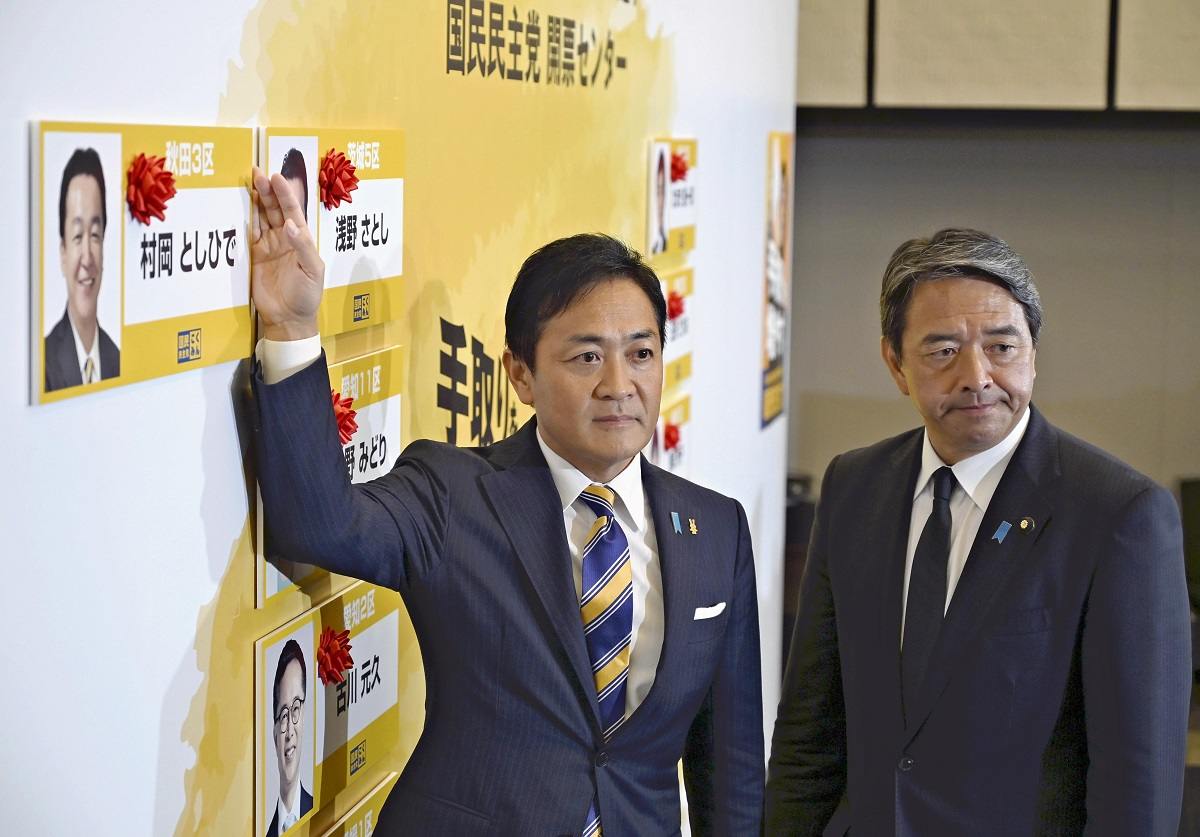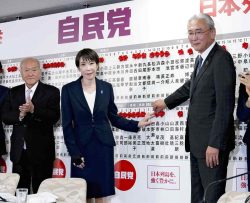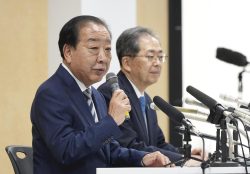Japan Election: DPFP’s Realism Helped Power Its Surge in Lower House; Party Won More Seats Than It Had Candidates

Democratic Party for the People leader Yuichiro Tamaki, left, and the party’s secretary general Kazuya Shinba pose for a photo at a ballot counting center in Shinjuku Ward, Tokyo, on Sunday.
16:13 JST, October 28, 2024
Key members of the Democratic Party for the People all handily won seats in their constituencies, including party leader Yuichiro Tamaki in Kagawa Constituency No. 2 and Diet affairs chief Motohisa Furukawa in Aichi Constituency No. 2.
The DPFP had a strong showing in the proportional representation segment as well, and increased its total seat count in the lower house from seven before the dissolution of the lower house to 28. A party with 21 or more seats can submit bills on its own.
“We said we would increase after-tax pay, that we would reduce social insurance premiums, and the people have entrusted us with their wish to see these things get done,” Tamaki said on an online show on Sunday evening.
In the election, the party stressed economic policies with a focus on support for households, saying it would reduce the consumption tax to 5% and cut income taxes and utility costs. The party also said it would increase after-tax pay for working people. As for the Liberal Democratic Party’s problem with money in politics, the DPFP proposed the full disclosure of survey, research, public relations and accommodation expenses for political parties as well as the abolition of political activity funds. The party also called for revising the Political Funds Control Law.
The DPFP’s realistic, policy-centered approach, aimed at solutions rather than confrontation, helped drive support from conservative and independent voters who distrust the LDP but dislike other left-leaning opposition parties.
The DPFP also shored up support from private-sector industrial unions affiliated with the Japanese Trade Union Confederation (Rengo), a powerbase of the party, and focused on performing better in the proportional representation segment.
The party managed to win three seats in proportional representation for the Tokai region, but most of the party’s candidates who ran for both proportional representation and in a constituency won their constituency. That meant the party had too few candidates to claim all of its proportional representation wins. In accordance with the Public Office Election Law, two of the seats it won in the Tokai region went to other parties. The DPFP gave up another seat in the North Kanto region for the same reason.
Top Articles in Politics
-

Japan PM Takaichi’s Cabinet Resigns en Masse
-

Sanae Takaichi Elected Prime Minister of Japan; Keeps All Cabinet Appointees from Previous Term
-

Japan’s Govt to Submit Road Map for Growth Strategy in March, PM Takaichi to Announce in Upcoming Policy Speech
-

LDP Wins Historic Landslide Victory
-

LDP Wins Landslide Victory, Secures Single-party Majority; Ruling Coalition with JIP Poised to Secure Over 300 seats (UPDATE 1)
JN ACCESS RANKING
-

Japan PM Takaichi’s Cabinet Resigns en Masse
-

Japan Institute to Use Domestic Commercial Optical Lattice Clock to Set Japan Standard Time
-

Israeli Ambassador to Japan Speaks about Japan’s Role in the Reconstruction of Gaza
-

Man Infected with Measles Reportedly Dined at Restaurant in Tokyo Station
-

Videos Plagiarized, Reposted with False Subtitles Claiming ‘Ryukyu Belongs to China’; Anti-China False Information Also Posted in Japan






















